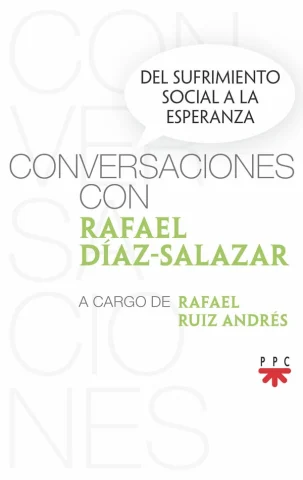Rafael Ruíz Andrés, Professor of Religious Sociology at the Complutense University of Madrid and one of our most prestigious sociologists of current academic affairs, has published in PPC the results of an interesting dialogue with the almost emeritus Professor of Sociology Rafael Díaz-Salazar, held between the first months of 2024 and the first week of April 2025, when Pope Francis was still alive.
The co-authors of the book are people of relevance in the academic world of sociology at the Complutense University of Madrid. First, the fine interviewer, Rafael Ruiz Andrés (Palencia 1991), a prestigious professor at that university and author of an important doctoral thesis already published with great success on secularization in Spain during the twentieth century.
The interviewee is Rafel Díaz-Salazar (Ciudad Real 1956), professor of sociology at the Faculty of Political Science and Sociology of the Complutense University of Madrid, an authority in the field of religious sociology and politically marked as a left-wing Catholic and committed to Christianity in the PSOE and lately in international ecosocialism. He is the author of important works on this subject referring to Antonio Gramsci and, of course, his interesting study "The Catholic factor in Spanish politics. Del Nacionalcatolicismo al laicismo, in PPC in 2006 and other works of religious sociology that were present in the democratic transition in Spain and that explain the rapid growth of socialism in Spain at that time in the seventies.
Revolutionary Christians: faith and social commitment
From the very first pages, Rafael Díaz-Salazar has no shame in explaining his conversion to Marxism, his class consciousness, his commitment to justice and social action from his youth to the present, always with a tenuous link to Christianity: "I am the fruit of the Christian workerism of the HOAC" (15). It is interesting in the personal life of Ruiz-Salazar the confusion between the life of personal prayer and the practice of cultural and spiritual formation (30-31). All this goes together with a total absence of sacramental life and Eucharistic devotions or meditative reading of the classics of spirituality (256-257).
It seems to Díaz-Salazar that religion has mutated and has become something more personal or familiar and less public and ostensible (47). All this forms a rupture of unity of life between faith in Jesus Christ and his doctrine.
His historical vision of the Church is full of commonplaces and ignorance: "the Church allied with power" (97), or this other statement: "it was a misfortune that Protestantism could not take root in our country" (66). Likewise, he shows a great ignorance of the subject when he affirms that the Inquisition expelled the Jews and the Moors from Spain (80, 89).
The knowledge about the late-Francoism is exposed when he affirms with all forcefulness, as someone who dominates the knowledge of the matter, that the two pillars of the regime were Opus Dei and the ACNdP. Quite simply, the dictator never allowed himself to be dominated by any institution or group of people who could overshadow him and, furthermore, Opus Dei did not have the aim of entering politics, nor the extension, nor the capacity to politically influence the regime since it never got involved in politics, nor did it have people or institutions to do so. It is understood that, if he is wrong in something so basic and well known, how many times will he have been wrong in his sociological theories expressed in this work (75).
Regarding the sources of his thought, it is enough to read the list of authors that he himself presents to confirm that we are before a genuine exponent of "Christians for socialism", since he is superficially a believer and is also imbued with the social question, not only Marxist, but also committed to revolutionary action (16).
He then added that for young people of his age and his line of thought, the north was "the hunger for justice and the hunger for God were connected and deeply united to our being. We were revolutionaries and Christians at the same time (...). Revolutionary Christians" (17).
Pages later he summarized his commitment-vocation: "to dedicate myself to political commitment and direct action, like Jesus of Nazareth, to change the reality of injustice and exploitation suffered by the working class world" (20).
Shortly thereafter, he will point out how his struggle took shape in the Complutense University as a professor of Social Structure of Spain: "I have always been clear that I had to walk with two feet: one was there and the other in the world of social movements and other socio-political and Christian organizations in order to accompany the formation of activists and generate critical public opinion" (23).
Sociology of religion and the challenges of Christianity
Logically, the two authors of the book will end up speaking as sociologists of religion and of the new map of religious sociology in Spain, they venture dire predictions for Christianity, such as its disappearance. Although they give all kinds of possibilities, including that of the Catholic Church benefiting from the reigning secularism.
Indeed, it can happen that the Holy Spirit brings to Catholic temples and to the warmth of Christian families men and women and pagan families who, in the heat of the liturgy, discover the "Deus absconditus" in the interior of the Christian soul and of the churches and of Christian charity in its many and varied forms of corporal and spiritual works of mercy.
Diaz-Salazar is wrong to blame the defeat of the growth of Catholics in the center-left vote on John Paul II. The social doctrine of the Church revalued by him has had its continuity in Pope Francis. Perhaps the key lies in the fact that John Paul II, who came from Poland to fight against Marxism as an engine of political life, opened the eyes of many left-wing activists to the anti-Christian anthropology contained in Marxism (78).
Conversations with Rafael Díaz-Salazar








